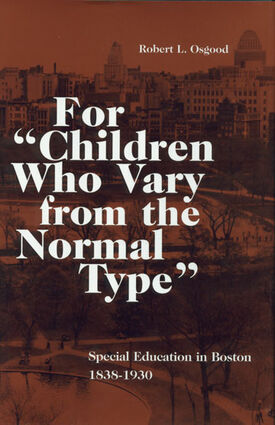
For “Children Who Vary from the Normal Type”
First Edition
Description
In his perceptive study of the education of disabled children during the 19th and early 20th centuries, Robert Osgood focuses upon the Boston school system as both typical and a national leader among urban centers at that time. Osgood points out that a host of significant figures worked in education in the region, including Horace Mann, George Emerson, and John Philbrick, and also Thomas Hopkins Gallaudet, Samuel Gridley Howe, Edouard Seguin, Hervey Wilbur, and Walter Fernald, each of the latter group noted for first founding and/or directing institutions for individuals with disabilities.
For “Children Who Vary from the Normal Type” describes the growth of Boston and its educational system during this period, then examines closely the emergence of individual programs that catered to students formally identified as having special needs: intermediate schools and ungraded classes; three separate programs for students with children; special classes for mentally retarded children; and other programs established between 1908 and 1913. Osgood describes these programs and their relations with each other, and also the rationales offered for their establishment and support. This detailed examination graphically depicts how patterns of integration and segregation in special education shifted over time in Boston, and provides a foundation for continuing the present-day discussion of the politics and realities of inclusion.
Robert L. Osgood is Assistant Professor of Education at Indiana University/Purdue University in Indianapolis, IN.